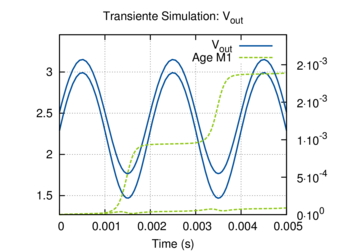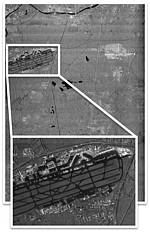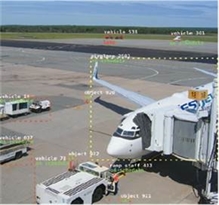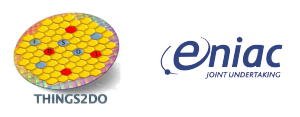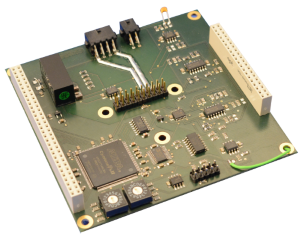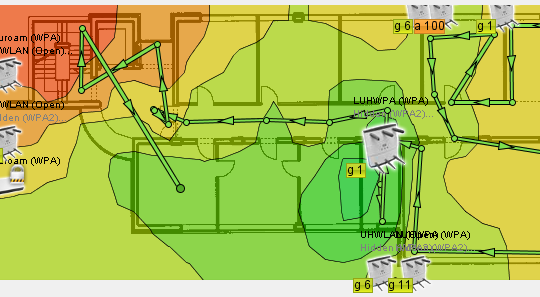Electronic Design Automation
-
ROBUSTROBUST researches new methods and procedures for designing robust nanoelectronic systems. The project defines quantitative measures of robustness. These metrics are determined by abstracting models of robustness and by applying new analysis methods suitable for the system level.Led by: Prof. Dr.-Ing. Erich BarkeTeam:Year: 2009Funding: BMBFDuration: Mai 2009 - April 2012
![]()
![]()
-
NEEDSHighly integrated electronic systems with heterogeneous components enable reduction of resources and cost. To further benefit from the potential of electronic systems, NEEDS has the goal to advance the research in designing a new class of electronic systems, where several dies are stacked above each other (three-dimensional integrated circuits).Led by: Dr.-Ing. Markus OlbrichTeam:Year: 2013Funding: The project NEEDS is funded by the Bundesministerium für Bildung und Forschung (BMBF).Duration: 2010 - 2013
![]()
![]()
-
RESCAR 2.0The IMS is subcontractor of the Infineon AG and will develop methods to manage domain-overlapping constraints.Led by: Prof. Dr.-Ing. Erich BarkeTeam:Year: 2014Funding: BMBFDuration: February 2011 - April 2014
![]()
![]()
-
3D-FloorplanningThe main goal of this research project is to find appropriate optimization algorithms and datastructures for 3D-Floorplanning. Furthermore, new relevant optimization goals should be identified and analysed.Team:Year: 2014Duration: completed
![]()
![]()
-
Reliable Behavioural ModellingThis project aims at generating behavioural models which include parameter variations of the original circuit. Parameter variations are represented by affine arithmetic.Led by: Prof. Dr.-Ing. Erich BarkeTeam:Year: 2014
-
Solving methods for semi-symbolic analog simulationParameters of analog circuits are not exactly known as they are influenced by fabrication, aging or environment temperature. At the Institute of Microelectronic Systems an analog circuit simulator was developed which use affine arithmetic to simulate these parameter deviations. This project aims at increasing the convergence area by using parameter splitting.Led by: Prof. Dr.-Ing. Erich BarkeTeam:Year: 2014Duration: January 2012 - May 2015
-
ANCONA: Analog Mixed-Level Modeling with Accelerated Mixed-Signal Simulation to Increase Analog CoverageThe IMS develops method and measures for the analysis of analog verification coverage. The goal is to evaluate and to increase the verification coverage of analog and mixed-signal circuits.Led by: Dr.-Ing. Markus OlbrichTeam:Year: 2017Funding: BMBFDuration: Juli 2014 - Juni 2017
![]()
![]()
-
New Simulation Methods for Accelerated Mixed-Signal SimulationThis research project is based on an approach for the automated model generation for accelerated mixed-signal simulation of analog circuit models and the associated simulation methodology for a transient analysis. Studies have shown good results, which make a significant acceleration in the simulation of mixed analog/digital-systems. Up to now, the current approach is limited to piecewise-constant input stimuli. One of the fundamental goals of this project is an extension of the novel simulation methodology that enables additional input signal types.Led by: Prof. Dr.-Ing. Erich BarkeTeam:Year: 2019Funding: Deutsche Forschungsgemeinschaft (DFG): BA 812/24-1Duration: March 2014 - February 2017
-
Formal Abstraction and Verification of Analog Circuits (faveAC)In the faveAC project, methods are being developed for the modeling and formal verification of analog circuits.Led by: Dr.-Ing. Markus OlbrichTeam:Year: 2019Funding: DFGDuration: März 2017 - Februar 2020
Processor Architectures
-
High Temperature Measurement While DrillingThe goal of the research is an MWD processor system for drilling tools used for geothermal drilling in ambient temperatures up to 300 °C. The processing of the project includes research aspects in the fields of hardware design, fault tolerance of digital systems and ASIC design.Led by: Prof. Dr.-Ing. H. BlumeTeam:Year: 2014Duration: 2012-2014
![]()
![]()
-
GEBO - High Temperature ElectronicIn this project, the design of mixed-signal circuits for signal processing is studied under high temperature conditions. For this, research on analog circuits and digital signal processing architectures will be conducted in order to adapt common design approaches to the requirements of high temperature technology.Led by: Prof. Dr.-Ing. H. BlumeTeam:Year: 2014Duration: 2009-20111
![]()
![]()
-
RAPANUI - Rapid-Prototyping for Media Processor Architecture ExplorationDesign, implementation, and evaluation of a prototyping-based Designmethodology for processor architectures for digital signal processing.Led by: Jun.-Prof. Dr.-Ing. G. Payá-VayáTeam:Year: 2014
-
OPAROIn the development of integrated, programmable circuits, the optimization of power dissipation and temperature distribution is becoming increasingly important. So far, however, these can only be determined by very time-consuming simulations. Therefore, precise models for the determination of power dissipation shall be developed and mapped together with the functional emulation on FPGAs. By accelerating the determination of power dissipation and temperature distribution, specific optimizations of the architecture and the application code can then be made taking real input data into account.Led by: Prof. Dr.-Ing. H. BlumeTeam:Year: 2014
![]()
![]()
-
Hearing4AllThe joint venture "Hearing4all" that the IMS-AS participates in with multiple sub-projects, has been chosen as one of the federal cluster of excellence projects Friday June 15th 2012. In the scope of this project the IMS-AS aims to develop high-performance and low-power processor architectures for digital hearing systems, such as cochlear implants or hearing aids.Led by: Prof. Dr.-Ing. H. Blume, Jun.-Prof. Dr.-Ing. G. Payá-VayáTeam:Year: 2015Duration: November 2012 - December 2018
![]()
![]()
-
Stochastic ProcessorStochastic computing has recently emerged as a promising approach for designing energy-efficient embedded hardware systems, taking into account the ability of many applications (e.g., computer vision) to tolerate the loss of precision in the computed results. Rather than designing the hardware for worst case scenarios featuring expensive guard-bands, designers can relax the implementation constraints and deliberately expose hardware variability, obtaining significant processing performance improvements and energy benefits.Led by: Jun.-Prof. Dr.-Ing. G. Payá-Vayá, Prof. Dr.-Ing. Holger BlumeTeam:Year: 2015Funding: Deutsche Forschungsgemeinschaft (DFG)Duration: February 2016 - January 2019
![]()
![]()
-
Design of a Configurable, Massive-Parallel Vector Processor Architecture for Computer Vision and a Framework for the Implementation of Object Recognition Applications for Embedded SystemsThe increasing complexity of current computer vision algorithms for autonomous driving, such as object detection and classification using neural networks, represents a challenge for automotive system designers. Providing a real-time processing system under hard real-time constraints and a low energy (budget a few watts) is difficult to achieve even with current technical platforms. The goal of this project is to design a new approach of application-specific vector processor for FPGA implementation. The well-known overhead of other platforms (e.g. GPUs) shall be avoided by using several strategies: Novel functional mechanisms, a modular and customizable architecture and a suitable development framework, which is especially designed for the implementation of automotive applications.). An FPGA-based prototype will demonstrate the performance of the vector processor concept for a selected application at the end of the project.Led by: apl. Prof. Dr.-Ing. G. Payá VayáTeam:Year: 2016Duration: Mai 2016 - Oktober 2017
![]()
![]()
-
TETRACOMNowadays, continuous development of digital signal processing applications, e.g., video-based advanced driver assistance systems, are pushing the limits of existing embedded systems and are forcing system developers to spend more time on code optimization. These applications often involve complex mathematical functions like trigonometric, logarithmic, exponential, or square root operations. In particular, these functions can only efficiently be computed on standard general purpose embedded processors, using highly optimized, processor specific arithmetic evaluation software libraries. Another alternative is to extend the embedded processor architectures with a specific hardware accelerator.Led by: Jun.-Prof. Dr.-Ing. G. Payá-VayáTeam:Year: 2016Duration: January 2016 - July 2016
![]()
![]()
-
CHORUSA highly optimized hardware/software module library for intelligent sensor systems in highly automated driver assistance applications based on the reconfigurable Dream Chip Technologies DCT10A SoM platformLed by: Jun.-Prof. Dr.-Ing. G. Payá-VayáTeam:Year: 2018Funding: BMWiDuration: 01.11.2018 - 31.03.2021
![]()
![]()
-
Smart Hearing Aid Processor (Smart HeaP)In the Smart Hearing Aid Processor (Smart HeaP) project, a novel hearing aid processor is designed, developed and built which, despite its simple programmability and wireless Bluetooth interface, is characterized by low power consumption and high computing power.Led by: Prof. Dr.-Ing. H. BlumeTeam:Year: 2018Funding: BMBFDuration: April 2018 - Juni 2022
![]()
![]()
-
Multi-Energy Harvesting (MEH) - A Flexible Platform for Energy Harvesting in Home AutomationIn this project, a platform concept for intelligent home automation components is developed, which can serve as a basis for next-generation sensors and actors. The main characteristic of this platform concept is ultra-low power consumption and ultra-low voltage operation. In combination with harvested energy from multiple sources (multi-energy harvesting), an extended lifetime and reduced battery cell requirements become possible compared to current systems.Led by: Prof. Dr.-Ing. H. Blume, Prof. Dr.-Ing. B. Wicht, apl. Prof. Dr.-Ing. G. Payá VayáTeam:Year: 2019Funding: BMBFDuration: October 2018 - March 2021
![]()
![]()
-
EcoMobilityDuring the European project "EcoMobility", the IMS will improve autonomous electric vehicles in regards to sustainability, connectivity and safety together with 46 partners from all over Europe. The IMS will especially focus on intelligent scheduling of tasks on heterogeneous processor systems.Led by: Prof. Dr.-Ing. Holger Blume, M.Sc. Matthias LüdersTeam:Year: 2023Funding: KDT JUDuration: 2023-2025
![[Translate to English:] Offizielles Logo von "EcoMobility"]()
![[Translate to English:] Offizielles Logo von "EcoMobility"]()
Analog/Mixed-Signal-Design
-
GEBO - High Temperature ElectronicIn this project, the design of mixed-signal circuits for signal processing is studied under high temperature conditions. For this, research on analog circuits and digital signal processing architectures will be conducted in order to adapt common design approaches to the requirements of high temperature technology.Led by: Prof. Dr.-Ing. H. BlumeTeam:Year: 2014Duration: 2009-20111
![]()
![]()
-
Hybrid DCDC ConvertersExplore the potential of hybrid integrated DCDC converters, by combining inductive and capacitive DCDC converter schemes, study of theory and state-of-the-art, definition and implementation of an innovative converter concept.Led by: Prof. Dr.-Ing. Bernhard WichtTeam:Year: 2016Funding: Industry
![]()
![]()
-
High-voltage converter ICs >300 V for micro power supplies in IoT applicationsResearch on circuit and system concepts for DCDC and ACDC converters for the direct connection of an IC or electronic systems built from it to the 230V network with the motivation to save external large-volume power supplies and to set optimal power efficiency depending on the operation. In addition to IoT, applications in the fields of electromobility, industry and energy are addressed.Led by: Prof. Dr.-Ing. Bernhard WichtTeam:Year: 2017
![]()
![]()
-
Switched-Mode Power Supplies with Digital ControlThis project explores the possibilities and advantages of adaptive digital control for automotive switched-mode power supplies. The goals are better control performance with less area and lower cost, less parameter variations, improved transient response.Led by: Prof. Dr.-Ing. Bernhard WichtTeam:Year: 2018Funding: IndustrieDuration: completed
![]()
![]()
-
Highly Integrated Current Sensing for High-performance Power ElectronicsDevelopment of circuit and system concepts for highly integrated current sensing with galvanic isolation for drives / motors and DCDC converters in various power classes.Led by: Prof. Dr.-Ing. Bernhard WichtTeam:Year: 2018Funding: Bundesministerium für Bildung und Forschung / Robert Bosch GmbHDuration: completed
![]()
![]()
-
Highly Integrated ACDC Converters for Direct 230 V Mains Supply of Integrated CircuitsResearch on circuit and system concepts for ACDC converters for direct 230V mains supply of integrated circuits (ICs) and electronics modules containing those ICs with the goal to eliminate the need for bulky external power supplies and to optimize the power efficiency dependent on load conditions.Led by: Prof. Dr.-Ing. Bernhard WichtTeam:Year: 2018Funding: Bundesministerium für Bildung und ForschungDuration: completed
![]()
![]()
-
Gate Driver with Digitally Controlled Slope ShapingInvestigation, modelling and optimization of the switching behavior of various power semiconductors (IGBT, CoolMOS, OPTIMOS, SiC FET). Concept development and circuit design for optimized gate drivers with digitally controlled slope shaping for motor drive, SMPS and PFC applications.Led by: Prof. Dr.-Ing. Bernhard WichtTeam:Year: 2018Funding: IndustryDuration: completed
![]()
![]()
-
Fast switching DCDC convertersResearch on circuit concepts for fast switching integrated DCDC converters with the goal of system cost reduction by eleminating external componentsLed by: Prof. Dr.-Ing. Bernhard WichtTeam:Year: 2018Funding: IndustrieDuration: completed
![]()
![]()
-
Gate Drivers for High-Voltage DevicesSystem and circuit concepts for gate driver ICs to control galvanic isolated power transistors, including GaN devices. Targets are improvements in reliability, reduced cost and new functionalities.Led by: Prof. Dr.-Ing. Bernhard WichtTeam:Year: 2018Funding: Öffentlich gefördert und IndustriekooperationDuration: completed
![]()
![]()
-
Research on reconfigurable, passive microelectronic components for energy efficiency and flexibility (ERMI)This research project uses new, reconfigurable passive components for integrated energy-efficient voltage transformers for local power supply (point-of-load). The goal is increased energy efficiency and a phase-adapted circuit design. This is especially important for multi-phase converters that use a large number of parallel inductors to meet the increasing requirements for highly efficient and powerful power supplies for modern microcontrollers and processors in important growth areas such as mobility, industrial, energy and biomedicine.Led by: Prof. Dr.-Ing. Bernhard WichtTeam:Year: 2019Funding: BMBF „Forschung für neue Mikroelektronik“ (ForMikro)Duration: 01.10.2019 – 31.09.2023
![]()
![]()
-
Multi-Energy Harvesting (MEH) - A Flexible Platform for Energy Harvesting in Home AutomationIn this project, a platform concept for intelligent home automation components is developed, which can serve as a basis for next-generation sensors and actors. The main characteristic of this platform concept is ultra-low power consumption and ultra-low voltage operation. In combination with harvested energy from multiple sources (multi-energy harvesting), an extended lifetime and reduced battery cell requirements become possible compared to current systems.Led by: Prof. Dr.-Ing. H. Blume, Prof. Dr.-Ing. B. Wicht, apl. Prof. Dr.-Ing. G. Payá VayáTeam:Year: 2019Funding: BMBFDuration: October 2018 - March 2021
![]()
![]()
-
GaN-on-SiThe GaN-on-Si process technology enables a fully integrated solution for future power electronics, including high efficiency, small size and minimized parasitics. Depending on the level of GaN integration that can be achieved, additional monolithic integration markets become viable. While this offers a significant opportunity for innovation and differentiation, a minimum threshold level of integration is required before this becomes achievable. The aim of this project is to explore the options and limitations for GaN monolithic integration - to gain experience, develop best practice and provide feedback to process development.Led by: Prof. Dr.-Ing. Bernhard WichtTeam:Year: 2020Funding: IndustrieDuration: 01.10.2017 – 31.09.2020
![]()
![]()
-
Fully integrated and system-optimized electronics solutions for solar modules(Voyager-PV)For three decades, the idea of inverters integrated directly into the solar module has been pursued in science and industry. With such AC solar modules, enormous cost and quality advantages are possible. The aim of the project is to create the technological prerequisites for a drastic reduction in the cost of small-scale PV system electronics, while at the same time meeting significantly higher reliability and service life requirements in this segment and the new future requirements with regard to grid suitability, digitization and security.Led by: Prof. Dr.-Ing. Bernhard WichtTeam:Year: 2020Funding: BMWi 7. Energieforschungsprogramm „Innovationen für die Energiewende“Duration: 01.04.2020 – 31.03.2023
![]()
![]()
-
Investigation of efficient voltage converter topologies for the next generation of microcontrollersThe increasing use of driver assistance systems through to fully autonomous vehicles requires the integration of a large number of different sensors in the automobile. More and more powerful microcontrollers are required for the evaluation and further processing of the sensor data. The aim of the project is to research and develop a power management system that can be directly integrated into the microcontroller. The focus is on high energy efficiency, compactness and low costs. In addition, solutions for scalability of the system are to be developed that allow easy adaptation to different output power ranges.Led by: Prof. Dr.-Ing. Bernard WichtTeam:Year: 2021Funding: IndustrieDuration: 01.04.2020 – 31.03.2023
![]()
![]()
-
Integrated Circuit Design for a High-voltage Class-D amplifier (SmartAmp)The overall goal of this project is to implement a high voltage (min. 60 V) and a high frequency class‑D amplifier including integrated current replication circuit and signal generator for harsh environment at temperatures up to 175 °C.Led by: Prof. Dr.-Ing. Bernhard WichtTeam:Year: 2022Funding: IndustrieDuration: 01.06.2021-31.05.2023
![]()
![]()
Design Space Exploration
-
EFdiS – Use of airborne SAR with digital interfaceThe goal of this research project is the processing of FMCW sensor signals. The first step is intended to digitize the analog data on board through a suitable expansion card. In the second step, the digitized data is to be processed on board, and thus converted to an aerial image.Led by: Prof. Dr.-Ing. H. BlumeTeam:Year: 2014Duration: October 2012 - December 2014
-
OPAROIn the development of integrated, programmable circuits, the optimization of power dissipation and temperature distribution is becoming increasingly important. So far, however, these can only be determined by very time-consuming simulations. Therefore, precise models for the determination of power dissipation shall be developed and mapped together with the functional emulation on FPGAs. By accelerating the determination of power dissipation and temperature distribution, specific optimizations of the architecture and the application code can then be made taking real input data into account.Led by: Prof. Dr.-Ing. H. BlumeTeam:Year: 2014
![]()
![]()
-
Digital Video-processing for automation in agricultureWithin this project, algorithms are developed, architectures explored and a final hardware-platform designed and evaluated. The overall system will be tested in a field test.Led by: Prof. Dr.-Ing. H. BlumeTeam:Year: 2019Duration: a 2017-2019
![]()
![]()
-
Compact Realtime SAR-Image processorThe goals of this project are the generation and compression of high resolution Synthetic Aperture Radar (SAR) images under real time conditions. Compared to camera based electro-optical sensors, a SAR system operates almost independent from daylight and weather conditions. State-of-the-art SAR sensor systems achieve spatial resolutions up to 10 cm at 10 km altitude. By using FPGAs for high performance digital signal processing tasks, aerial images can be generated in real time even in case of very large image dimensions.Led by: Prof. Dr.-Ing. H. BlumeTeam:Year: 2020Duration: 2008-2020
![]()
![]()
Driver Assistance Systems
-
PROPEDES - Predictive Pedestrian Protection at NightThe objectives of the project PROPEDES is the design and demonstration of a flexible hardware archtecture based on a Very Long Instruction Word (VLIW) Softcore microprocessor for a vision-based pedestrian detection. The VLIW processor is to be supported by dedicated hardware accelerators to speed up future high-quality video-based driver assistance systems. Finally the architecture is to be implemented on a real-time FPGA-based demonstrator.Led by: Prof. Dr.-Ing. Holger BlumeTeam:Year: 2011Funding: Bundesministerium für Bildung und Forschung (BMBF)Duration: August 2008 - July 2011
![]()
![]()
-
OpenFASIn the scope of this project, a library of modules for driver assistence systems, based on a multicore processor architecture will be created. The project is in collaboration with the videantis corporation.Led by: Prof. Dr.-Ing. Holger BlumeTeam:Year: 2012Funding: "Zentrales Innovationsprogramm Mittelstand" des Bundesministeriums für Wirtschaft und Technologie (BMWi)Duration: Juni 2012 - Oktober 2013
![]()
![]()
-
DESERVE - Development Platform for Safe and Efficient DriveDESERVE is a project funded by the European Union. The aim of the project is the promotion and evolution of advanced driver assistance systems (ADAS). These systems are devoted to support the driver in the safe control of the vehicle. For this purpose, the DESERVE platform is planned to be developed. This platform will be the base for future development of advanced driver assistance systems in Europe.Led by: Prof. Dr.-Ing. H. Blume, apl. Prof. Dr.-Ing. G. Payá VayáTeam:Year: 2013Funding: Europäische Union, Bundesministerium für Bildung und ForschungDuration: September 2012 - August 2015
![]()
![]()
-
ASEVThe goal of this sub-project of the BMBF project "Automatic Situation Interpretation for Event Triggered Video Surveillance" is to elaborate a concept for a hardware architecture that enables a SIFT (Scale Invariant Feature Transform) feature extraction under application-specific processing conditions as performance and power consumption. SIFT features offer a good basis for robust object identification and tracking for event triggered video surveillance. The field of application is thereby the airport apron, which is highly relevant to security. The concept was implemented on a FPGA-based hardware platform to build a demonstrator which was tested at the end of the project at the airport of Braunschweig.Led by: Prof. Dr.-Ing. H. Blume, Jun.-Prof. Dr.-Ing. G. Payá-VayáTeam:Year: 2014Funding: Bundesministerium für Bildung und Forschung (BMBF)Duration: Mai 2010 - April 2013
![]()
![]()
-
Efficient Hardware Architectures for Fast Image Sequence AnalysisIn practice, general reliability of modern driver assistance systems under arbitrary traffic, weather and illumination conditions often is a problem. Because more robust algorithms are computationally very intensive, this project deals with the examination of heterogenous hardware architectures and the evaluation of new mechanisms for complex applications in the field of camera-based driver assistance.Led by: Prof. Dr.-Ing. H. BlumeTeam:Year: 2014Funding: Hans L. Merkle StiftungDuration: February 2014 - February 2017
-
mDAS - Implementation of a real-time demonstrator for multicore-based driver assistance systemsThe goal of this Project is the conceptual design of a real-time mutlicore-based demonstrator for video-based driver assistance algorithms. Therefore, different performance metrics will be displayed in order to compare platform-specific performance characteristics.Led by: Prof. Dr.-Ing. Holger BlumeTeam:Year: 2014Funding: Siemens AGDuration: February 2014 - August 2014
![]()
![]()
-
ZIM Dream Chip Technologies GmbHIn cooperation with Dream Chip Technologies GmbH, Garben, Germany, the Institute of Microelectronic Systems develops with funding from the Federal Ministry of Economic Affairs and Energy a camera system with integrated algorithms for high quality real time motion estimation in the area of driver assistance systems.Led by: Prof. Dr.-Ing. H. BlumeTeam:Year: 2015Funding: Bundesministerium für Wirtschaft und EnergieDuration: September 2015 - December 2016
![]()
![]()
-
THINGS2DO - THIN but Great Silicon 2 Design ObjectsTHINGS2DO is an ENIAC project, funded by the European Union and the Federal Ministry of Education and Research. The project aims to develop the new Fully Depleted Silicon On Insulator (FD-SOI) technology and the corresponding tool environment for high efficient and highly integrated circuits. The capabilities of the technology are further demonstrated through a demonstrator in the area of Advanced Driver Assistance Systems (ADAS).Led by: Prof. Dr.-Ing. H. BlumeTeam:Year: 2016Funding: Europäische Union, Bundesministerium für Bildung und ForschungDuration: February 2016 - March 2018
![]()
![]()
-
GreenMLThe project "GreenML" aims to exemplify a holistic AI design process by the highly efficient and resource-optimized implementation of essential FAS functions like object detection, object classification, and scene contextualization on particular hardware. Deep Learning (DL) has become a central approach for modern AI applications. Even though energy-efficient DL has become a target in research, currently isolated solutions are often created that do not unleash the full potential for resource-efficient AI. In this project, we will focus on a holistic approach: from hardware to efficient coding and transfer of data and models to dynamic and resource-adaptive software to enable multi-criteria optimization of all facets of an AI-enabled system. As an example, we demonstrate the potential of this approach using the scenario of a modern driver assistance system (FAS). With about 67 million registered vehicles and increased e-mobility, saving required energy by combining efficient algorithms, communication, and hardware is urgently needed. Our "Green Assisted Driving" project addresses different energy consumption, safety, and flexibility metrics. The consortium combines low-power hardware, learning of efficient representations from large data sets, hyperparameter optimization, and network design using AutoML, as well as methods of transfer learning, semi-supervised learning, and network pruning to prototype highly efficient and dynamically controllable models on a FAS. and demonstrate the savings potential of a holistic approach.Led by: Prof. Dr.-Ing. habil H. BlumeTeam:Year: 2023Duration: 2023-2026
![]()
![]()
-
EcoMobilityDuring the European project "EcoMobility", the IMS will improve autonomous electric vehicles in regards to sustainability, connectivity and safety together with 46 partners from all over Europe. The IMS will especially focus on intelligent scheduling of tasks on heterogeneous processor systems.Led by: Prof. Dr.-Ing. Holger Blume, M.Sc. Matthias LüdersTeam:Year: 2023Funding: KDT JUDuration: 2023-2025
![[Translate to English:] Offizielles Logo von "EcoMobility"]()
![[Translate to English:] Offizielles Logo von "EcoMobility"]()
Biomedical Engineering
-
Real-time, low-latency sonification of complex movementsThe goal of this research project in the field of biomedical engineering is to generate an auditory feedback (sonification) of human movements. The IMS focuses on examing the performance of different hardware platforms for this application. Relevant performance parameters are the platforms power dissipation and the overall latency. Finally, the project goal is to enhance stroke rehabilitation by additionally providing auditory arm movement feedback. This could lead to shortened rehabilitation periods. Furthermore, the mobile hardware platform developed at the IMS allows home based rehabilitation.Led by: Prof. Dr.-Ing. BlumeTeam:Year: 2013Funding: Europäischer Fonds für regionale Entwicklung (EFRE)Duration: February 2011 - June 2013
-
BIOFABRICATION for NIFEBIOFABRICATION for NIFE ist ein interdisciplinary research network between the Hanover Medical School, the Leibniz University of Hanover and the Hanover University of Music, Drama and Media. The goal of this research network is to achieve methods for growing biocompatible organic implants with heavily reduced rejection reactions.Led by: Prof. Dr.-Ing. BlumeTeam:Year: 2014Funding: VolkswagenStiftung and County Lower SaxonyDuration: May 2013 - June 2018
![]()
![]()
-
Hearing4AllThe joint venture "Hearing4all" that the IMS-AS participates in with multiple sub-projects, has been chosen as one of the federal cluster of excellence projects Friday June 15th 2012. In the scope of this project the IMS-AS aims to develop high-performance and low-power processor architectures for digital hearing systems, such as cochlear implants or hearing aids.Led by: Prof. Dr.-Ing. H. Blume, Jun.-Prof. Dr.-Ing. G. Payá-VayáTeam:Year: 2015Duration: November 2012 - December 2018
![]()
![]()
-
OptogeneticWithin this cooperation with the Institute of Technical Chemistry and the Institute of Quantum Optics of the Leibniz Universität Hannover, methods are being studied to control the behavior of intracellular processes from the outside with light. Optogenetics can be used to specifically modify light-insensitive cells in order to respond to the influence of light. Due to the common previous experience between the project partners, especially optogenetic questions in the context of tissue engineering are focussed.Led by: Prof. Dr.-Ing. Holger BlumeTeam:Year: 2016
![]()
![]()
-
TETRACOM - Mobile platform for real-time sonification of movements for medical rehabilitationThe rehabilitation of stroke patients is an intense and lengthy process. The common therapy approach is based on movement training in presence of a therapist. Through many repetitions a remobilization of the patient is achieved. Due to this highly time‐consuming treatment, the costs of for the therapy are very high. Therefore, in this research project, we are focusing on the design of a mobile system, which will provide a motion feedback by means of sonification. It will enable therapist‐independent training and as a result lessen the strain on patient and healthcare system.Led by: Prof. Dr.-Ing. Holger BlumeTeam:Year: 2016Funding: FP7 ‐ ICT ‐ 2013 ‐ 10Duration: September 2013 - August 2016
![]()
![]()
-
Efficient Real-time Processing of EEG-SignalsA brain-computer interface (BCI) is a system that generates signals to control an artificial system based on measurements of the activity of the central nervous system, for example, to replace, enhance or supplement certain tasks of human action. Modern BCIs are often based on the decoding or interpretation of EEG signals, as such systems are both non-invasive and cost-effectively available. These sensors detect a variety of independent, superimposed signals that make their immediate use for controlling a digital system difficult. Therefore, each application and corresponding application environment requires specifically designed and customized algorithms. This project therefore investigates methods for the efficient real-time processing of EEG signals. For this purpose, the Institute of Microelectronic Systems is developing a complete system of dedicated, configurable hardware in combination with a signal-processing framework specially adapted for the processing of EEG signals.Led by: Prof. Dr.-Ing. Holger Blume, Jun.-Prof. Dr.-Ing. G. Payá-VayáTeam:Year: 2017
![]()
![]()
-
ZIM D-Sense - Development of a Testing System for the Diagnosis of Sensorimotor Regulation Abilities in AthletesThe aim of the project is to develop a mobile diagnostics system which can be used to to assess the sensorimotor regulation abilities in athletes. The system should consist of multiple sensor units and allow the athlete or coach to quickly and precisely perform different functional sensorimotor tests. The sensor units can be placed at different points on or next to the subject's body, depending on the concrete test being performed. Also depending on the test, different algorithms are to be used for classifying and evaluating the measurements from the sensor units. A database helps the user to interpret the test results and provides reference values for risk assessments regarding injuries.Led by: Prof. Dr.-Ing. H. BlumeTeam:Year: 2017Funding: „Zentrales Innovationsprogramm Mittelstand“ of the BMWi - Federal Ministry for Economic Affairs and EnergyDuration: 2017-2019
![]()
![]()
-
Smart Hearing Aid Processor (Smart HeaP)In the Smart Hearing Aid Processor (Smart HeaP) project, a novel hearing aid processor is designed, developed and built which, despite its simple programmability and wireless Bluetooth interface, is characterized by low power consumption and high computing power.Led by: Prof. Dr.-Ing. H. BlumeTeam:Year: 2018Funding: BMBFDuration: April 2018 - Juni 2022
![]()
![]()
System Design
-
QUANTUS IV - MAIUSThe Institute of Microelectronic Systems supports physical experiments in space in the QUANTUS IV - MAIUS Project. Within the project platforms and algorithms for digital signal processing in space will be delevoped and evaluated.Led by: Prof. Dr.-Ing. Holger BlumeTeam:Year: 2014Funding: "National Space Program" of the Federal Ministry for Economic Affairs and Energy (BMWi)Duration: August 2014 - December 2021
![]()
![]()
-
GEBO - High Temperature ElectronicIn this project, the design of mixed-signal circuits for signal processing is studied under high temperature conditions. For this, research on analog circuits and digital signal processing architectures will be conducted in order to adapt common design approaches to the requirements of high temperature technology.Led by: Prof. Dr.-Ing. H. BlumeTeam:Year: 2014Duration: 2009-20111
![]()
![]()
-
Site-optimized Wireless Communication ArchitecturesThe communication parameters to be expected in an application scenario result from the combination of the employed standards' properties (IEEE 802.11, BLE, IEEE 802.154, ZigBee) and the specific radio wave propagation conditions of the considered building.Led by: Prof. Dr.-Ing. Holger BlumeTeam:Year: 2014
![]()
![]()
-
TETRACOM - Mobile platform for real-time sonification of movements for medical rehabilitationThe rehabilitation of stroke patients is an intense and lengthy process. The common therapy approach is based on movement training in presence of a therapist. Through many repetitions a remobilization of the patient is achieved. Due to this highly time‐consuming treatment, the costs of for the therapy are very high. Therefore, in this research project, we are focusing on the design of a mobile system, which will provide a motion feedback by means of sonification. It will enable therapist‐independent training and as a result lessen the strain on patient and healthcare system.Led by: Prof. Dr.-Ing. Holger BlumeTeam:Year: 2016Funding: FP7 ‐ ICT ‐ 2013 ‐ 10Duration: September 2013 - August 2016
![]()
![]()
-
Efficient Real-time Processing of EEG-SignalsA brain-computer interface (BCI) is a system that generates signals to control an artificial system based on measurements of the activity of the central nervous system, for example, to replace, enhance or supplement certain tasks of human action. Modern BCIs are often based on the decoding or interpretation of EEG signals, as such systems are both non-invasive and cost-effectively available. These sensors detect a variety of independent, superimposed signals that make their immediate use for controlling a digital system difficult. Therefore, each application and corresponding application environment requires specifically designed and customized algorithms. This project therefore investigates methods for the efficient real-time processing of EEG signals. For this purpose, the Institute of Microelectronic Systems is developing a complete system of dedicated, configurable hardware in combination with a signal-processing framework specially adapted for the processing of EEG signals.Led by: Prof. Dr.-Ing. Holger Blume, Jun.-Prof. Dr.-Ing. G. Payá-VayáTeam:Year: 2017
![]()
![]()
-
ZIM D-Sense - Development of a Testing System for the Diagnosis of Sensorimotor Regulation Abilities in AthletesThe aim of the project is to develop a mobile diagnostics system which can be used to to assess the sensorimotor regulation abilities in athletes. The system should consist of multiple sensor units and allow the athlete or coach to quickly and precisely perform different functional sensorimotor tests. The sensor units can be placed at different points on or next to the subject's body, depending on the concrete test being performed. Also depending on the test, different algorithms are to be used for classifying and evaluating the measurements from the sensor units. A database helps the user to interpret the test results and provides reference values for risk assessments regarding injuries.Led by: Prof. Dr.-Ing. H. BlumeTeam:Year: 2017Funding: „Zentrales Innovationsprogramm Mittelstand“ of the BMWi - Federal Ministry for Economic Affairs and EnergyDuration: 2017-2019
![]()
![]()
-
BECCAL-IScope of the bilateral BECCAL-I of DLR and NASA is the design of a platform for atom optic experiments on board of the international spece station. Within the project the Institute of Microelectronic Systems will develop and evaluate platforms and algorithms for digital signal processing in space.Led by: Prof. Dr.-Ing. Holger BlumeTeam:Year: 2018Funding: "National Space Program" of the Federal Ministry for Economic Affairs and Energy (BMWi)Duration: August 2018 - Dezember 2021
![]()
![]()
Reconfigurable Architectures
-
Circuit Design and Physical Design for a Novel FPGA ArchitectureEvaluation and analysis of the implemtability and performance of a new type of field programmable gate array (FPGA).Led by: Prof. Dr.-Ing. H. Blume, apl. Prof. Dr.-Ing. G. Payá VayáTeam:Year: 2013Funding: Federal Ministry of Education and ReserachDuration: May 2013 - June 2014
![]()
![]()
-
TUKUTURIIn the TUKUTURI-project, a for ASIC-synthesis optimized VHDL-description of a soft core processor architecture will be optimized for FPGA synthesis. The suitability of special functional units for specific applications with regard to performance and area consumption will be analyzed.Led by: Jun.-Prof. Dr.-Ing. G. Payá-VayáTeam:Year: 2014Funding: Wege in die Forschung II
![]()
![]()
-
Design of a Configurable, Massive-Parallel Vector Processor Architecture for Computer Vision and a Framework for the Implementation of Object Recognition Applications for Embedded SystemsThe increasing complexity of current computer vision algorithms for autonomous driving, such as object detection and classification using neural networks, represents a challenge for automotive system designers. Providing a real-time processing system under hard real-time constraints and a low energy (budget a few watts) is difficult to achieve even with current technical platforms. The goal of this project is to design a new approach of application-specific vector processor for FPGA implementation. The well-known overhead of other platforms (e.g. GPUs) shall be avoided by using several strategies: Novel functional mechanisms, a modular and customizable architecture and a suitable development framework, which is especially designed for the implementation of automotive applications.). An FPGA-based prototype will demonstrate the performance of the vector processor concept for a selected application at the end of the project.Led by: apl. Prof. Dr.-Ing. G. Payá VayáTeam:Year: 2016Duration: Mai 2016 - Oktober 2017
![]()
![]()
[uncategorized]
-
Simulation of electronic devices and components through the influence of radiationSimulation of electronic devices and components under the influence of radiationLed by: PD Dr.-Ing. Dipl.-Phys. K. Weide-ZaageTeam:Year: 2014Duration: 01.09.2013-31.01.2015

